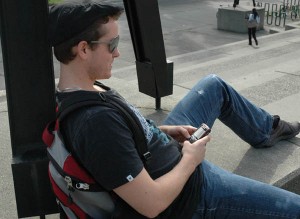How Facebook has affected dating
October 19, 2010 by Miranda Gathercole · Leave a Comment
Meagan Gill, Miranda Gathercole and Sarah Casimong explore how Facebook has changed the dating world for university students, as part of a continuing series on life in the age of social media.
The new age of breakups
October 12, 2010 by Jocelyn Gollner · Leave a Comment

Social media, such as Facebook, is affecting many aspects of our lives, such as how we breakup. (Photo by Jocelyn Gollner)
By Jocelyn Gollner and Amanda Punshon
In today’s age of social networking, sites such as Facebook and Twitter have become such a part of our lives that they even affect our break-ups.
“I hear very often that [people] meet on eHarmony or someplace like that. And so how they come together is kind of based on this artificial information that they have about each other,” said Bruce Bailey, a counsellor at Kwantlen Polytechnic University. “Instead of connecting, they just kind of… miss… just a bit at the beginning, and then they never really quite figure out how to build [a relationship.]“
Bailey said one of the main reasons that couples have trouble connecting is a lack of face-to-face contact. Tweeting and emailing replace actual conversations, and it’s harder to forge an attachment.
Without that initial connection, the relationship can start to fall apart, and once it does, people often choose to end things using social networking.
“Before the social media that we have, people would either call or break up in person. Maybe it’s a reflection of my age, but I’m a little surprised that people can text one another and break up that way,” Bailey said.
He said that despite the volume of communication that goes on via social networking, “the sense that I have, and this isn’t the least bit scientific, is that social media has left us completely exposed to the whole world.”
‘It’s like a pack of wolves
Alicia Con, a Kwantlen student, agreed.
“If you put it on Facebook it’s like a pack of wolves,” she said. “You’re basically setting yourself up for that. If you’re a more social person, and then once you break up, everyone’s like ‘Oh what happened, what happened, what happened?’ I think, just from previous experience, I’ve just learned not to put stuff like that up on Facebook. Because even if you take your status down, people are like ‘Oh are you dating someone?’ So it’s kind of giving people the opportunity to be really nosy.”
Peter Chow-White, assistant professor in the School of Communication at SFU, however, said that social media is often used in “finding out information about partners who may not be behaving monogamously.”
It’s a trend that Kwantlen counsellors and students have noticed as well.
“I find that young women will monitor the computer activity of their boyfriend,” Bailey said. “That’s a real issue — the whole ‘I don’t trust him. What should I do?’ And she’s not quite sure whom he’s talking to…[women] don’t like that.”
“If a girl or a guy sees a picture on Facebook or something of their boyfriend or their girlfriend with someone else, it could lead to a breakup,” said Amit Aujla, a Kwantlen student.
A cautuon against Facebook-creeping
It’s not just people who are dating who monitor each others’ online profiles. Exes are often just as nosy.
“One of my favourite comments from one of my students is that ‘my boyfriend and I broke up and then I saw that he friended his ex-girlfriend and I totally lost my…’ you know, fill in the blank,” said Chow-White.
Bailey cautioned against this so-called “Facebook creeping,” saying that while it mirrors what some older women do — namely, hiring a private investigator to make sure their partner isn’t lying — it’s “a little less valid, because a private investigator is trained and simply gets the information that they come across…an awful lot on Facebook is not true, necessarily, so checking him out is not necessarily checking him out.”
If you can’t seem to restrain yourself from creeping on your ex, there are online sites to help.
Blockyourex.com is a way for people to curb their Facebook-creeping habits. They enter their exes name, Facebook and Twitter account info and the URL of their blog, and then they can’t access any of their online information.
Another on-line site full of social media info and advice is Allfacebook.com. The self-proclaimed “Unofficial Facebook Resource,” provides satirical tips to help you “protect your emotional well-being.”
Tips include taking note of all your exes new friends (“this will provide you with more stalker material to draw false conclusions from,”) posting photos with members of the opposite sex (“by posting photos with others, you demonstrate that the relationship meant nothing to you [even though it clearly did],”) and applying new privacy settings (“while you may want your ex to see photos of you with a cute new romantic interest, you probably don’t want them to see the photos of the drunken stupor you got into last night.”)
Students finding ways to put social media to work
September 18, 2010 by Meagan Gill · Leave a Comment

Greg Spoorski uses his BlackBerry to check his Facebook messages while on a break from class on Sept. 16. (Photo by Meagan Gill)
Social networking sites such as Facebook and Twitter may seem like a major distraction from doing homework, or anything productive for that matter, but are they really a waste of time?
As well as spending time on Facebook poking people, commenting on friends’ new relationships and creeping random profiles, there are some ways Facebook can be used productively.
“If you can’t reach someone on the phone, you know they will be on Facebook. It’s helpful because you have a way of getting in contact with them if you missed a class and need their notes,” said Matthew Espinosa.
Some Facebook groups can be beneficial to studies.
“Everyone is using Facebook now. The people in my class want to start a new group where we can share ideas and keep in touch with each other,” said Brittany Bird.
Facebook has a group for Kwantlen Polytechnic University that lets students connect and post events happening on campus.
“I find Facebook very helpful with keeping in touch with friends, being able to buy/sell used textbooks and join study groups,” said Joe Che.
Facebook also has groups for the different programs offered at Kwantlen Polytechnic University. “The Official Kwantlen Page” is an example of one group that allows past and current students of the fashion program to get together, share ideas, plan events and post pictures of their creations.
“I find it very helpful to use social networking, especially Facebook and Twitter, as a marketing medium for my online business,” said Greg Spoorski.
Twitter is also a popular choice when it comes to social networking and an effective way to connect with people in 140 characters or less.
“I find Twitter incredibly helpful because of the speed it generates information at. I can find out what everyone is doing and things that are happening all around the world, ” said Anna Burchill.
Online anonymity results in less privacy
January 12, 2010 by Sarah Jackson · Leave a Comment

Annette Reynolds, sociology instructor at Kwantlen Polytechnic University, refused to allow her face to be published in a statement against the invasion of privacy introduced by internet technologies.
The explosion of personal information on the Internet is leading to “Facebook creeping,†new reasons for being fired, and, according to a Kwantlen sociology instructor, public humiliation.
“[Young people are] more inclined to invade other people’s privacy without feeling invasive about it,†said Annette Reynolds.
“There’s a tendency to feel like you can cross social barriers because there’s an anonymity. That’s a kind of cyber-bullying,†Reynolds said, remembering a time when she read hurtful comments on the teacher-rating web site RateMyProfessors. com.
Cyber-bullying is a rising trend, according to a Microsoft Canada Youthography Internet Safety survey released in February. The survey of people from nine to 17 years old found that 40 per cent of Canadian youth had been bullied online, up from 25 per cent in 2004. It also reported that 60 per cent of youth believe people bully because it is “cool.†More than half of the 16 per cent who said they have cyber-bullied another youth said there were no consequences to their bullying.
“Public humiliation is a form of entertainment,†said Reynolds.
Bullying is one of the side effects of an information free-for-all that includes blogs about people’s personal lives, YouTube videos featuring friends, and Facebook pages full of personal info. Privacy has a different meaning than it used to.
“I don’t think it’s fair to say kids today don’t care about their privacy,†said Micheal Vonn, B.C. Civil Liberties Association policy director. “Previous generations never had to think about this stuff because the system was so different.â€
In the past, privacy was provided by default before technological advances introduced a plethora of information databases. Now that personal information is required in order to access many Internet services, people must choose between those services and privacy. “What we really want is control,†said Vonn.
The government hasn’t hesitated to take advantage of the new opportunities for control, either. Technology-based surveillance, called dataveillance, is increasing as a form of policing and is a worrisome opportunity for state control, she said.
“The new policing philosophy is, ‘Why don’t we just know a whole lot about everybody all the time. Then we’ll be able to do a risk assessment.’â€
Knowing a lot about everybody all the time applies to personal relationships, too. A University of Guelph study released in August indicated that the more time a person spends on Facebook, the more likely they are to become jealous of their significant other because of overexposure to triggers. A person may become alarmed by a comment from someone saying “It was great to see you,†become jealous, and begin “Facebook creeping†that commentator’s profile for more information.
This trend in “Facebook creeping†leads to suspicions, just as government dataveillance does.
“[Data] starts to take on a reality and a life of its own… regardless of if you’ve done anything wrong,†said Vonn.
Employers are pursuing control too, said Michael Cox, who believes he was fired from a probationary bus-driver position with Coast Mountain Bus Company in January because of his blog.
“The company was sensitive to any kind of criticism and certainly sensitive to internal criticism,†Cox said. His blog included information about transit troubles during last winter’s snowstorms. “I think part of it was they wanted to make an example of me.â€
He advised bloggers and social media users to speak their minds but remember that their words could affect them professionally. “There is no such thing as true freedom of the press or true freedom of expression. There’s always going to be a limit.â€
The costs of censoring personal information that is being published online, such as reduced freedom of speech, need to be weighed against the benefits, which include retaining a job. In today’s digital age, the ability to avoid having personal details on the Internet isn’t always there. “The only way to remain a truly private individual would be to only purchase using cash and to be an electronic hermit,†said Cox.
It’s difficult to remain an electronic hermit, and one result is identity theft. Equifax Canada fraud specialist Vanessas Guillani told the Globe and Mail in June that identity theft went up 500 per cent from 1998 to 2003.
Identity theft is a big problem, but personal problems with identity itself are also on the rise. People can take on various identities through social media, which can result in a loss of self, according to Vonn. Internet game Second Life, which mimics real-world activities, including earning income and building relationships, has been featured in the news as a harbinger of real-life problems. A number of game users have adopted their character and attempted to create a perfect life, only to lose their jobs, friends and family. Some have fallen in love with virtual characters only to learn that the real person was not what they expected.
Sidebar: How to protect yourself
• Read privacy contracts, particularly those regarding health, credit-card and banking information.
• Ask questions or refuse to sign things that don’t seem worth it.
• Consider the implications of your pictures, thoughts and videos before you post them.
• Know your employer’s policies concerning social media.
• Remember that once you publish something online, you can never get it back.


